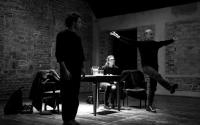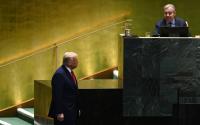Alexander Cockburn
Edward Said died in hospital in New York City Wednesday night at 6.30 pm, felled at last by complications arising from the leukemia he fought so gamely ever since the early 1990s.
We march through life buoyed by those comrades-in-arms we know to be marching with us, under the same banners, flying the same colors, sustained by the same hopes and convictions. They can be a thousand miles away; we may not have spoken to them in months; but their companionship is burned into our souls and we are sustained by the knowledge that they are with us in the world.
Few more than Edward Said, for me and so many others beside. How many times, after a week, a month or more, I have reached him on the phone and within a second been lofted in my spirits, as we pressed through our updates: his trips, his triumphs, the insults sustained; the enemies rebuked and put to flight. Even in his pettiness he was magnificent, and as I would laugh at his fury at some squalid gibe hurled at him by an eighth-rate scrivener, he would clamber from the pedestal of martyrdom and laugh at himself.
He never lost his fire, even as the leukemia pressed, was routed, pressed again. He lived at a rate that would have felled a man half his age and ten times as healthy: a plane to London, an honorary degree, on to Lebanon, on to the West Bank, on to Cairo, to Madrid, back to New York. And all the while he was pouring out the Said prose that I most enjoyed, the fiery diatribes he distributed to CounterPunch and to a vast world audience. At the top of his form his prose has the pitiless, relentless clarity of Swift.
The Palestinians will never know a greater polemical champion. A few weeks ago I was, with his genial permission, putting together from three of his essays the concluding piece in our forthcoming CounterPunch collection, The Politics of Anti-Semitism. I was seized, as so often before, by the power of the prose: how could anyone read those searing sentences and not boil with rage, while simultaneously admiring Edward's generosity of soul: that with the imperative of justice and nationhood for his people came the humanity that called for reconciliation between Palestinians and Israeli Jews.
His literary energy was prodigious. Memoir, criticism, homily, fiction poured from his pen, a fountain pen that reminded one that Edward was very much an intellectual in the nineteenth- century tradition of a Zola or of a Victor Hugo, who once remarked that genius is a promontory in the infinite. I read that line as a schoolboy, wrote it in my notebook and though I laugh now a little at the pretension of the line, I do think of Edward as a promontory, a physical bulk on the intellectual and political landscape that forced people, however disinclined they may have been, to confront the Palestinian experience.
Years ago his wife Mariam asked me if I would make available my apartment in New York, where I lived at that time, as the site for a surprise 40th birthday for Edward. I dislike surprise parties but of course agreed. The evening arrived; guests assembled on my sitting room on the eleventh floor of 333 Central Park West. The dining room table groaned under Middle Eastern delicacies. Then came the word from the front door. Edward and Mariam had arrived! They were ascending in the elevator. Then we could all hear Edward's furious bellow: "But I don't want to go to dinner with *******, Alex!" They entered at last and the shout went up from seventy throats, Happy Birthday! He reeled back in surprise and then recovered, and then saw about the room all those friends happy to have traveled thousands of miles to shake his hand. I could see him slowly expand with joy at each new unexpected face and salutation.
He never became blase in the face of friendship and admiration, or indeed honorary degrees, just as he never grew a thick skin. Each insult was as fresh and as wounding as the first he ever received. A quarter of century ago he would call, with mock heroic English intonation, "Alex-and-er, have you seen the latest New Republic? Have you read this filthy, this utterly disgusting diatribe? You haven't? Oh, I know, you don't care about the feelings of a mere black man such as myself." I'd start laughing, and say I had better things to do than read Martin Peretz, or Edward Alexander or whoever the assailant was, but for half an hour he would brood, rehearse fiery rebuttals and listen moodily as I told him to pay no attention.
He never lost the capacity to be wounded by the treachery and opportunism of supposed friends. A few weeks ago he called to ask whether I had read a particularly stupid attack on him by his very old friend Christopher Hitchens in the Atlantic Monthly. He described with pained sarcasm a phone call in which Hitchens had presumably tried to square his own conscience by advertising to Edward the impending assault. I asked Edward why he was surprised, and indeed why he cared. But he was surprised and he did care. His skin was so, so thin, I think because he knew that as long as he lived, as long as he marched onward as a proud, unapologetic and vociferous Palestinian, there would be some enemy on the next housetop down the street eager to pour sewage on his head.
Edward, dear friend, I wave adieu to you across the abyss. I don't even have to close my eyes to savor your presence, your caustic or merry laughter, your elegance, your spirit as vivid as that of d'Artagnan, the fiery Gascon. You will burn like the brightest of flames in my memory, as you will in the memories of all who knew and admired and loved you.






